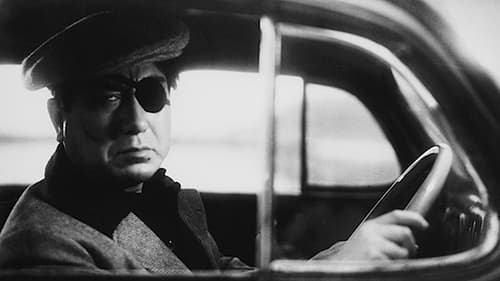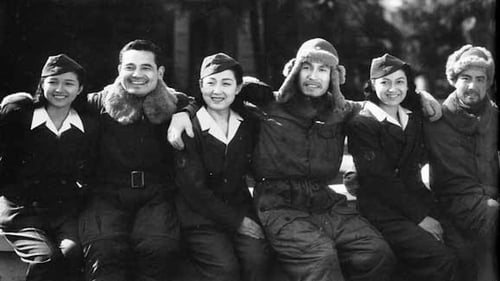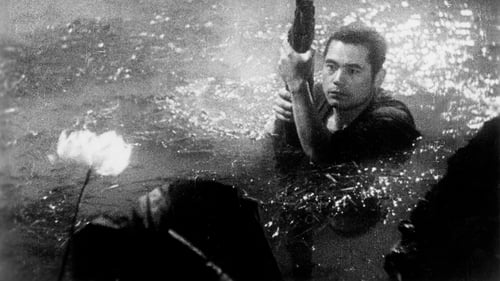Ko Yamamuro
출생 : 1907-12-17, Kochi Prefecture, Japan

An exciting historical drama in which a beautiful woman secretly solves the family problems of the Owari clan. Hibari Misora plays two roles: a charming princess and a dashing youngster, performs songs and dances throughout the film until the big decisive battle.

Early adaptation of the book "The Inugami Clan", featuring the detective Kōsuke Kindaichi.

Movie version of NHK renzoku drama "Tokyo Romance"

First film of the The Black Hooded Man series.

Saburo Hirota
Fifth delivery in the Tarao Bannai series, following the "master detective with seven faces" who uses his signature disguise to solve crimes with a double-barreled pistol.

The second film in the 1953 trilogy based on the long novel series The Great Bodhisattva Pass.

The first film in the 1953 trilogy based on the long novel series The Great Bodhisattva Pass.

1952 Japanese film directed by Kunio Watanabe.

Thug

Tanuma Kandayuu is a high class samurai of the house of Nabeshima. He finds a lavish board of Go (a Chinese Board game) at Kinbei's store. He recommend Kinbei to offer it to his lord. Kinbei hesitates at first, since he knows the board has a mysterious legend surrounding it; it's believed that for every game played on the board, one death is required.

A love triangle among a girl, her poor boyfriend, and a rich company president.

Writer Nemoto (as Ko Yamamuro)
A newly hired daily newspaper writer covering the society beat receives an assignment to cover Tokyo at night by walking and observing it. He gets into the right frame of mind by dressing the part as a vagrant with not a penny to his name. He gets into trouble ending up at the police station slammer overnight. He has no material to write about and, with his assignment unfulfilled, faces a cross editor.

The story of an airport and its air traffic control crew in a remote and northern Japanese town. Three of the air traffic controllers are female with one of them working with her dead fiancé's sister. The engaged man had gone to war and never returned.

전작에서 5년의 시간이 흐른 메이지 20년(1887년). 히가키 겐노스케와 대결한 후 더 큰 깨달음을 얻기 위해 여행을 떠났던 스가타 산시로는 어린 인력거꾼을 괴롭히는 미국 선원을 유도로 제압한다. 그 모습을 지켜보던 미대사관 직원이 산시로에게 접근해 대사관에서 열리는 권투 대 유도 시합에 출전해 보라고 권한다. 돈이 오가는 오락일 뿐인 야만적인 시합 모습에 질린 산시로는 권유를 단칼에 거절하고 도장으로 돌아온다. 곧이어 겐노스케의 동생들인 뎃신과 겐자부로가 산시로를 타도하고자 찾아오는데, 고민하던 산시로는 도장의 규율을 어기고 대결에 임하기로 한다.

Torakichi
The story of Sanshiro, a strong stubborn youth, who travels into the city in order to learn Jujutsu. However, upon his arrival he discovers a new form of self-defence: Judo. The main character is based on Shiro Saigo, a legendary judoka.

Assistant director
A 1943 film.

Date Masamune
A sentimental tale of the filial love between shogun Iemitsu (matinee idol Hasegawa) and his loyal old retainer Hikoza (comedian Roppa, playing somewhat against type).

Ine Onoda, the eldest daughter of a poor family of farmers, raises a colt from birth and comes to love the horse dearly. When the horse is grown, the government orders it auctioned and sold to the army. Ine struggles to prevent the sale.

This film attempts to reconstruct the tension of the Battle of Shanghai through an episode in an understated way, introducting its story in a documentary mode. In the film story, Japan's marine regiment protects Japanese residents and Chinese refugees-women and young children-from rampant street fighting, Shanhai Rikusentai unsparingly uses its first eight minutes for an official-mannered self-justification of the war. From the viewpoint of explaining Japan's military operation,the narration refers to the city s spatial division in sync with maps on screen.

A 1937 Japanese language film directed by Tomu Uchida, starring Ryo Akaboshi, Mitsuru Date and Hisao Furutani.

The Japanese equivalent of penny dreadfuls glorifying Jesse James, A Diary of Chuji’s Travels gives a unique gloss to the tale of Chuji Kunisada, the legendary bakuto (or gambler, the precursors to modern-day yakuza). One of the two remaining segments of Ito’s original four-hour trilogy, it depicts Chuji’s attempt to save the geisha Oshina, a rebellion against the rigid social structure of Edo Japan. With socialist overtones, it’s a passionate artifact of early Japanese film.











